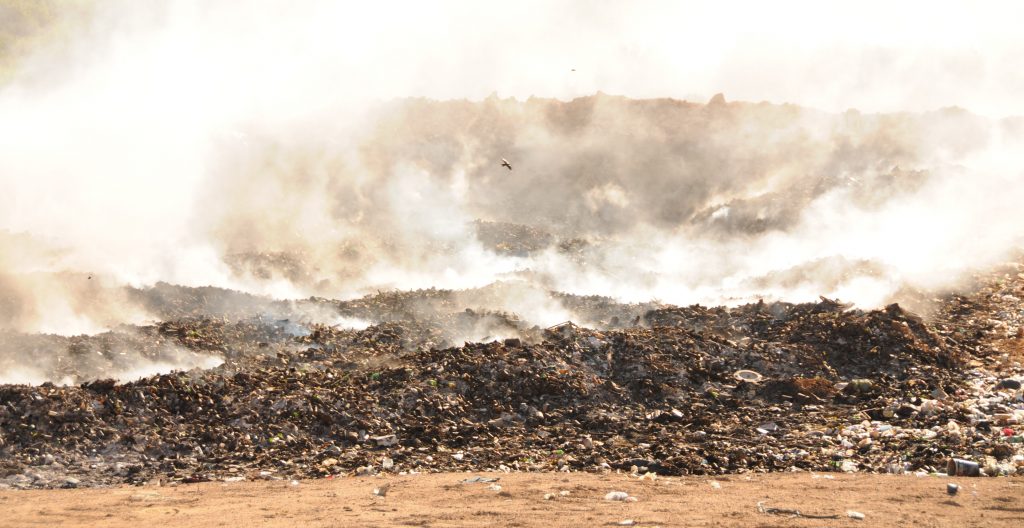
Based on data from the United Nations 3 billion people do not have access to controlled waste disposal, this is where waste is managed to mitigate its environmental and social impacts. Dreamcatcher has a long legacy of addressing waste challenges which are explored below. In addition through our Made in Melkhoutfontein project we utilise waste as a resource through crafting and making products, and we are busy tackling the challenge of organic waste through our Green Johanna initiative.
Melkhoutfontein, where Dreamcatcher are based, has historically been impacted by poor waste services. A decade ago, the local waste management system consisted of Hessequa Municipality collecting waste from the Stilbaai area, disposing it at Melkhoutfontein dumpsite and burning the majority of the waste (see image at top). There were no controls in place to mitigate the impacts of the site – no leachate management (the liquid generated when waste breaks down) or gas collection system, nor controls on whom and what could be dumped at the site. The burning of waste, as well as having environmental implications, had a significant impact on the health and wellbeing of Melkhoutfontein residents. The former Dreamcatcher Home Office was based on the site of a former dumpsite, and illegal dumping of waste in the community remains a challenge.
Dreamcatcher has been vocal in its criticism of this poor practice and for over a decade we have been working on a number of initiatives to improve the waste management system. Core to this has been encouraging the local authority to implement composting to handle organic waste since 2010.
Whilst there have been some improvements in recent years – for example waste, in general, is no longer openly burned in Melkhoutfontein with most waste being disposed of in Riversdale, and Henque Waste also provide a recycling programme, there are still significant improvements needed.
We are far from Hessequa Municipality’s vision of being a Zero Waste Society by 2020, as set out in the Integrated Development Plan’s covering 2012-2016 and 2017-2022 (note – this statement was removed in the revised Integrated Development Plan covering 2023-2028). Furthermore Dreamcatcher initiated a Community Waste Working Group representing the full eco-system in 2018 and provided Hessequa Municipality with a comprehensive plan to consider implementation, (free of charge) based on in-depth research and monitoring over a 10 year period. The Waste Working Group expressed concern that Hessequa Municipality was promoting the region, and particularly Stilbaai, a beautiful holiday destination, as one of the ‘Greenest Municipalities and towns in the country whilst the waste management system failed to adhere to legislative requirements.
The municipality has continued its dependency on landfill which as well as being the least sustainable waste management option (bottom of the waste hierarchy) is currently artificially cheap – and in stark contrast to their previous commitment to have no waste going to landfill by 2020! Moreover the landfill sites they operate perform poorly. Waste facilities in the Western Cape are licensed – and based on the latest available data no waste facility in Hessequa achieved a ‘Green’ compliance score (meaning only minor amendments were needed) from the Western Cape Department of Environmental Affairs and Development Planning as set out in the Garden Route District Municipality Integrated Waste Management Plan 2020 – 2025. All sites classified as ‘Amber’ (improvements needed) or ‘Red’ (major improvements needed) with the Melkhoutfontein site having a lowly compliance score of 47.3%. Whilst the site was licensed in 2014 (updated in 2018) there remains issues of non-compliance in particular the management of organic waste. As set out in its own Hessequa Waste Management Plan 2020-2024 the levels of compliance have gone down at the Melkhoutfontein site. Whilst the site is only licensed to accept garden and construction waste – and burning of waste is prohibited – our own monitoring shows the conditions of the license are not being fully adhered to.
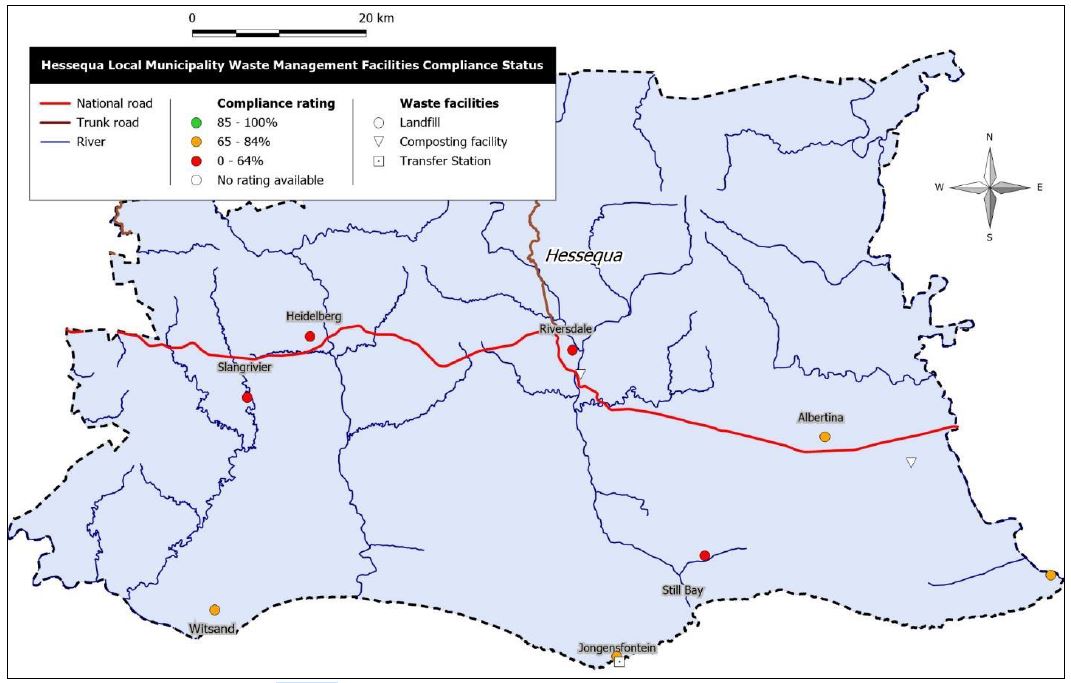
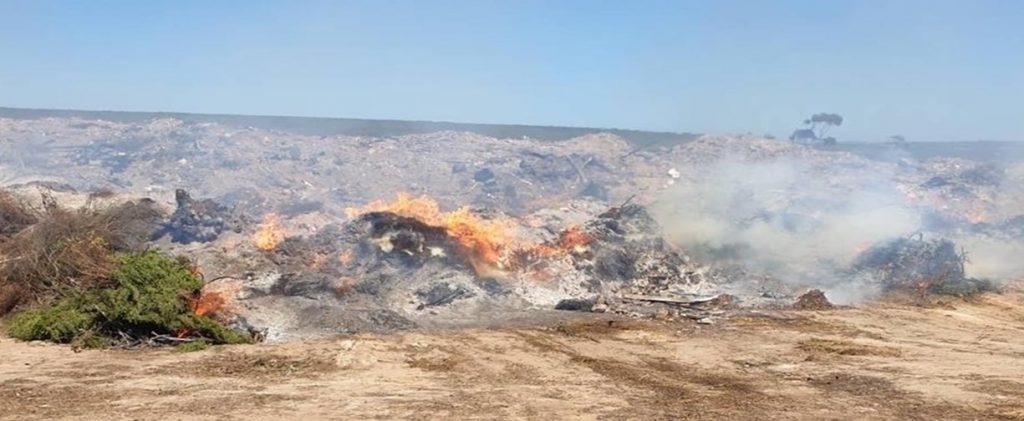
Since 2005 Dreamcatcher has worked on initiatives to address waste and its public health and environmental impacts in communities, with special focus on those areas affected the most: the townships of South Africa. Today, Dreamcatcher South Africa’s founder Anthea, has extensive experience of working in the waste sector, with specific focus on re-use, recycling and diverting organic waste from landfill. This includes collaborating with community-based tourism enterprises, social housing providers and multiple housing developments to improve waste management services both in South Africa and UK. Experience in the UK includes working on a government funded project where she collaborated with 73 social housing sites covering 31 local authorities. Working with staff and residents Anthea led on identifying challenges and implementing solution to improve waste management. This included behaviour change programmes – and specific focus on home composting due to the significant levels of organic waste generated and its impact on climate change. The project led to significant impacts on the ground, informed government policy, and the development of best practice which was shared at the International Solid Waste Association Annual Congress in Belgium and results have been published in the journal Sustainability.
Due to the ongoing waste system which Anthea viewed as unsustainable, and the lack of local technical waste expertise, Anthea reached out to the University of Brighton in the UK who have extensive experience and knowledge of waste. To this day Dreamcatcher continues to collaborate with Dr Ryan Woodard – who holds a PhD in waste management and the circular economy. For over 24 years he worked as a researcher and lecturer in waste at the University of Brighton on over 50 projects ranging from waste flows into landfill sites to training teams of community volunteers. He has written over 100 technical reports and journal papers with topics ranging from anaerobic digestion in Bangladesh to healthcare waste management in Cameroon. Other roles have included sitting on the UK government working group on waste data, on the editorial panel of Chartered Institution of Civil Engineering journal Waste and Resource Management, and on an international working group on waste communication and prevention.
Below provides a timeline of work Dreamcatcher has done in collaboration with partners to address waste issues.
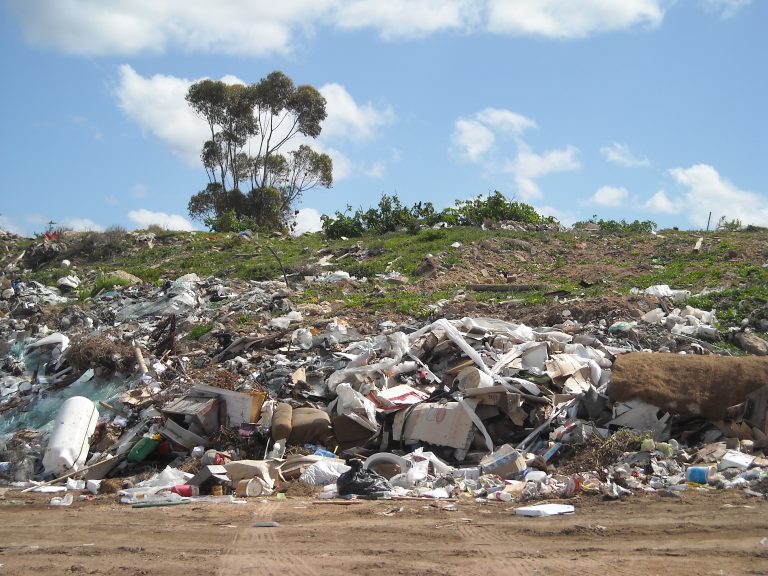
Dreamcatcher enterprises and Melkhoutfontein community members were becoming increasingly concerned about the poor waste management system and its significant impact on the environment, air quality and public health. This included waste being routinely burned in the open air by the municipality at the dumpsite, illegal dumping at the St Augustine's church grounds, and in the wider community. This included waste from all sources such as asbestos and medical waste.
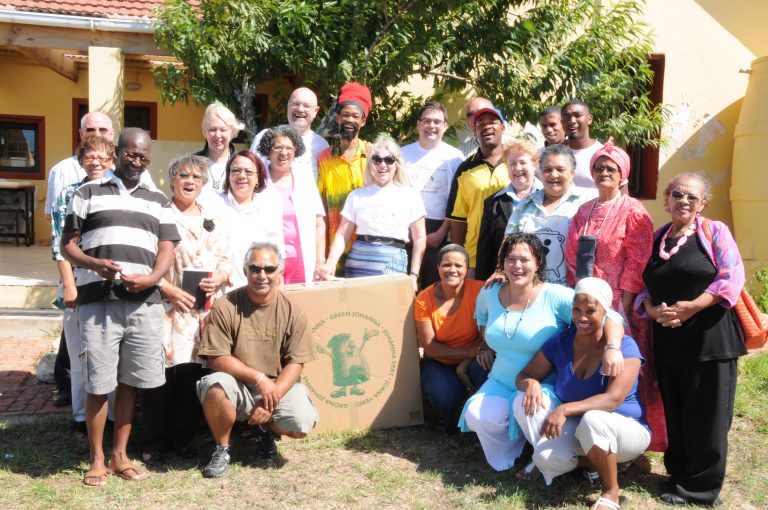
Dreamcatcher South Africa launched the first waste awareness training in Melkhoutfontein, Kayamandi and Stutterheim – this was attended by Dreamcatcher enterprises from across South Africa, community leaders, and staff from municipalities including Hessequa, Knysna and Sedgefield. For many, including municipality front-line staff, this was the first formal training they had received on waste. Topics included the public health and environmental impacts of waste, understanding the waste hierarchy, reflections on waste challenges in their area, and developing ideas to change behaviour. A delegation also met with the Hessequa Municipal Manager to discuss the waste concerns.
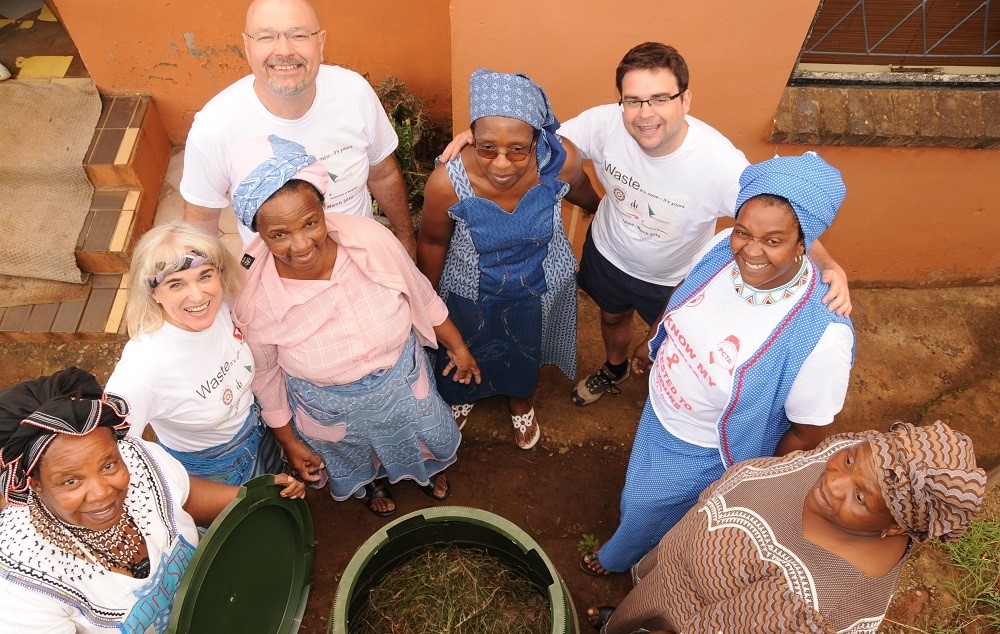
The training included the installation of the first Green Johannas composters in South Africa – this enclosed composting system can handle garden and food waste. The system originates from Sweden and Ryan and Anthea have extensive experience of using these units in the UK. The pilot included installing Green Johannas at Dreamcatcher tourism enterprises.
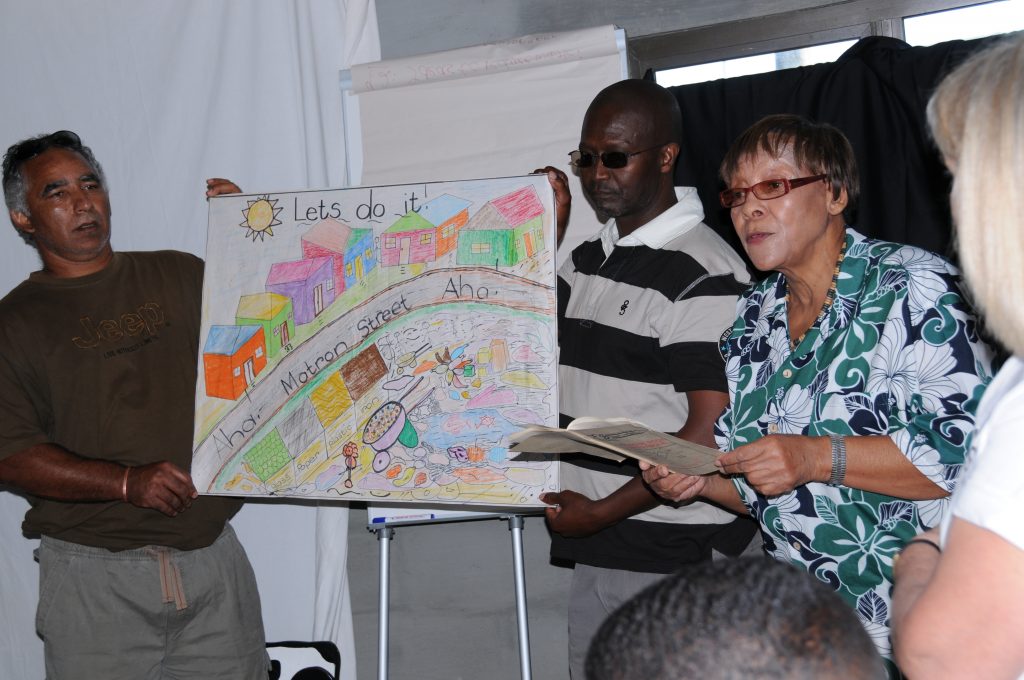
We continued delivering ongoing waste training in different communities. This included Kamammas and youth from different communities developing their ideas of posters to increase awareness on the impacts of poor waste management. Thanks to Marisa these were combined into a poster circulated in communities.
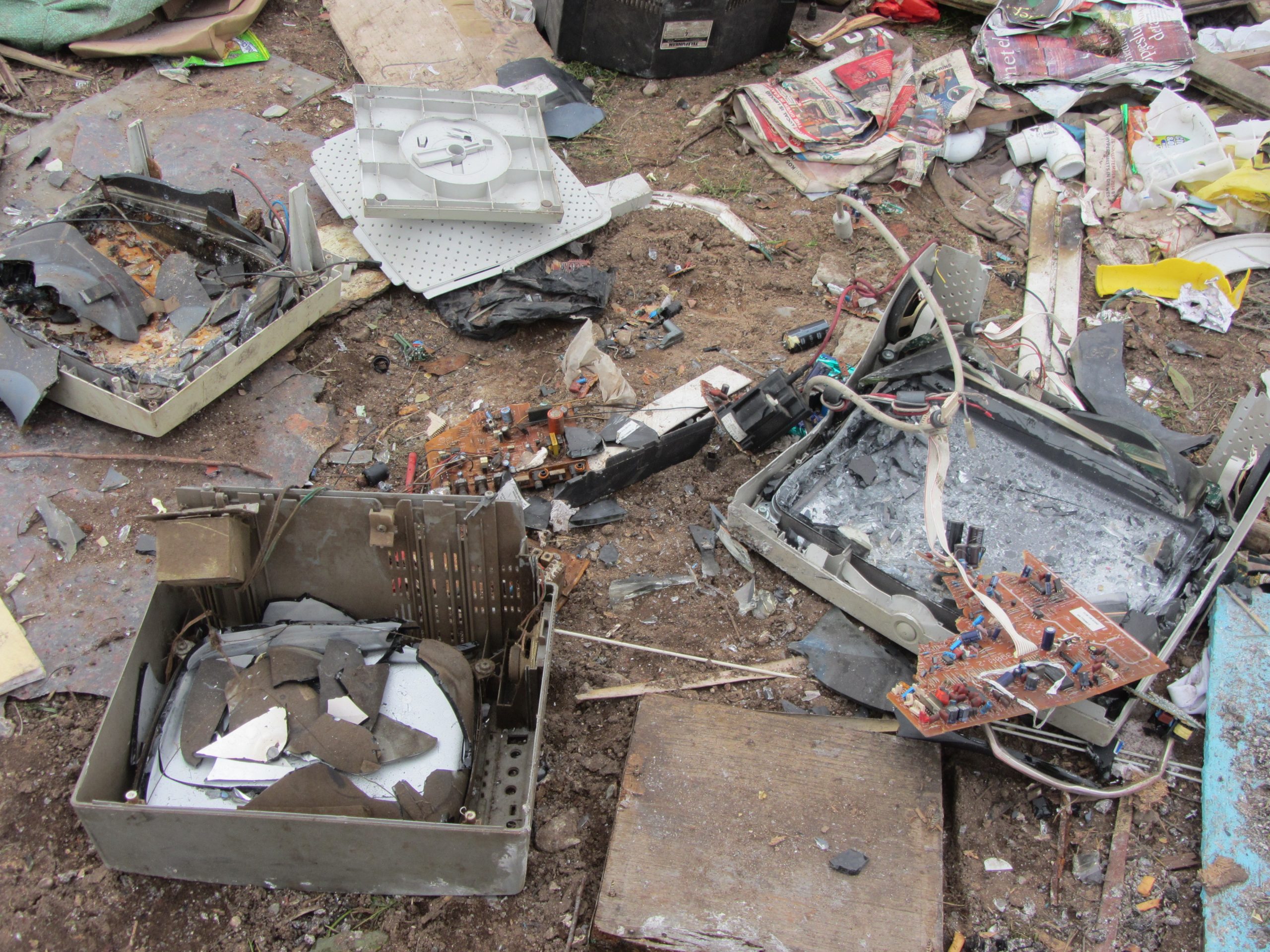
Whilst the Melkhoutfontein dumpsite was formally licensed by the Western Cape Department of Environmental Affairs and Development Planning in 2014, there were ongoing issues with non compliance with license conditions. This included waste still being openly burned by the municipality, which was prohibited. Dreamcatcher set up the Community Waste Working Group in Melkhoutfontein to lobby for change.
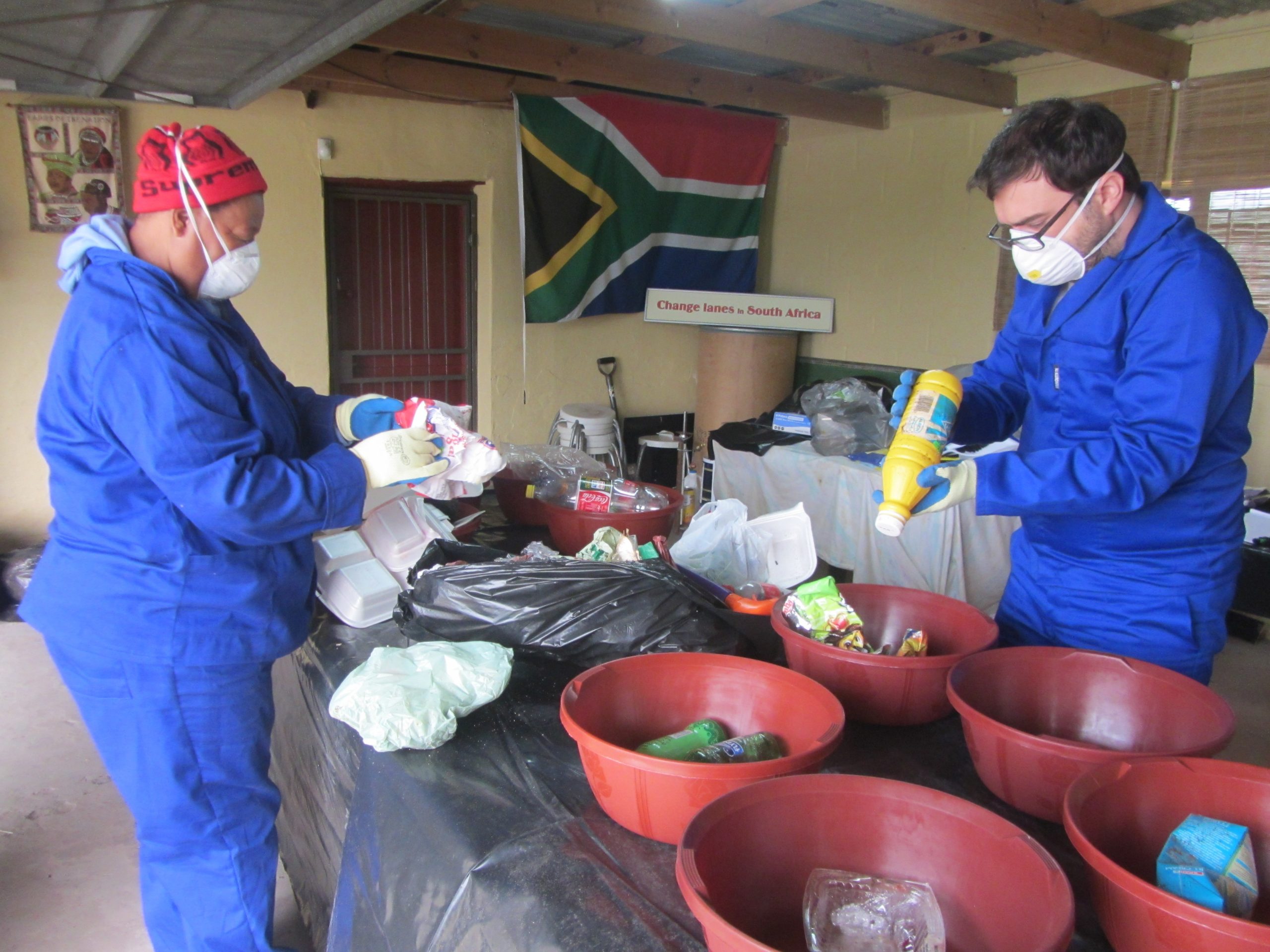
Dreamcatcher’s vision was to establish a crafting workshop transitioning waste into a resource to address the environmental and health impacts of poor waste management whilst stimulating enterprise and socio-economic development. Research was conducted mapping out waste streams including the first ever waste analysis in the local area. We collaborated with the community to identify needs and opportunities.
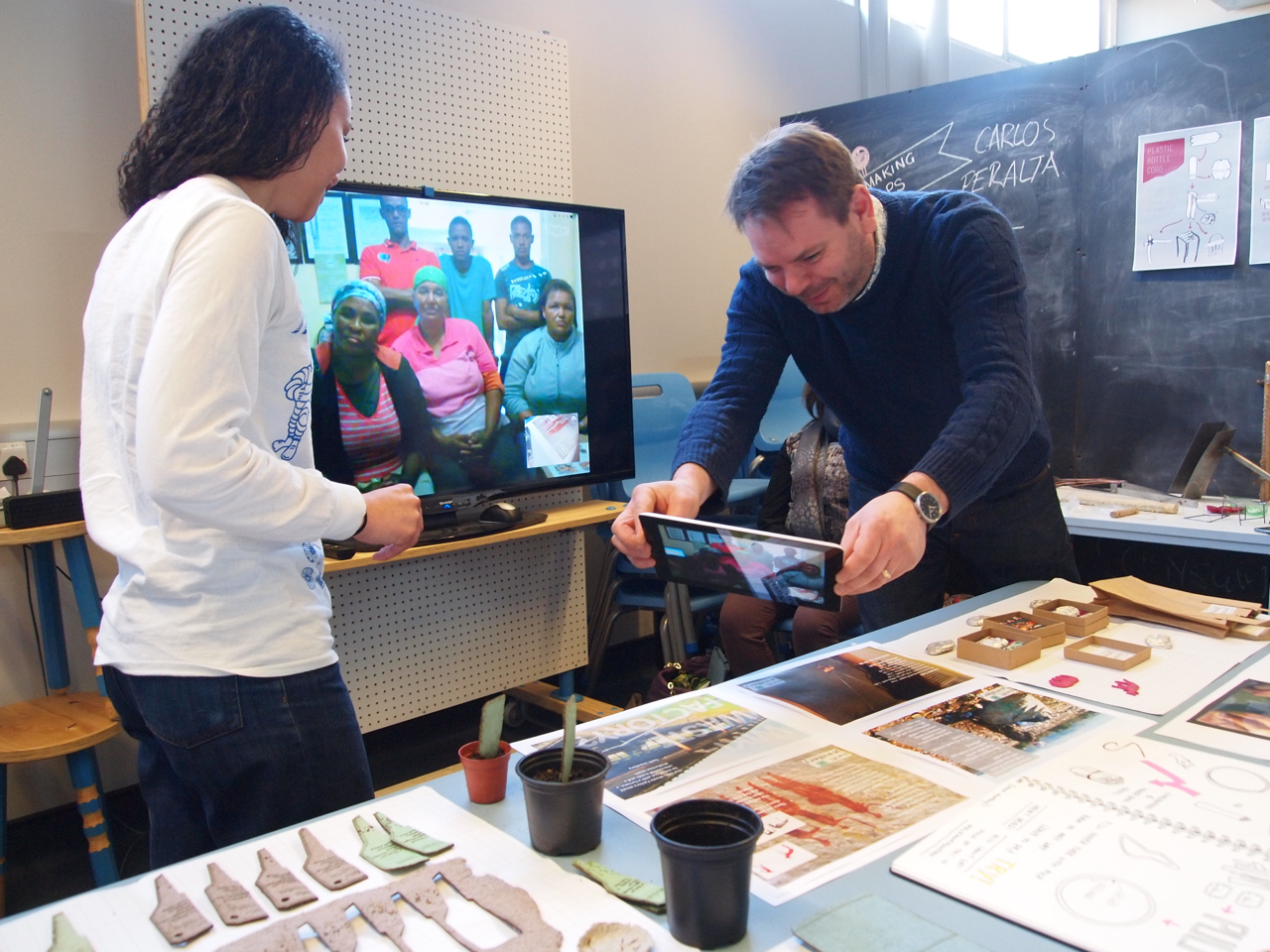
The information collected fed into a brief to art and design students at the University of Brighton. The brief was to develop products and crafts that could be made from the resources available whilst utilising low-cost technology and processes. The students presented back their ideas to Melkhoutfontein via video link to community representatives to critique. From this we identified products that could be made and the tools and resources to realise these ideas. You can read more about this project here. Thanks to the contributions of many supporters over the next couple of years we raised the funds needed to purchase the tools and other equipment needed.
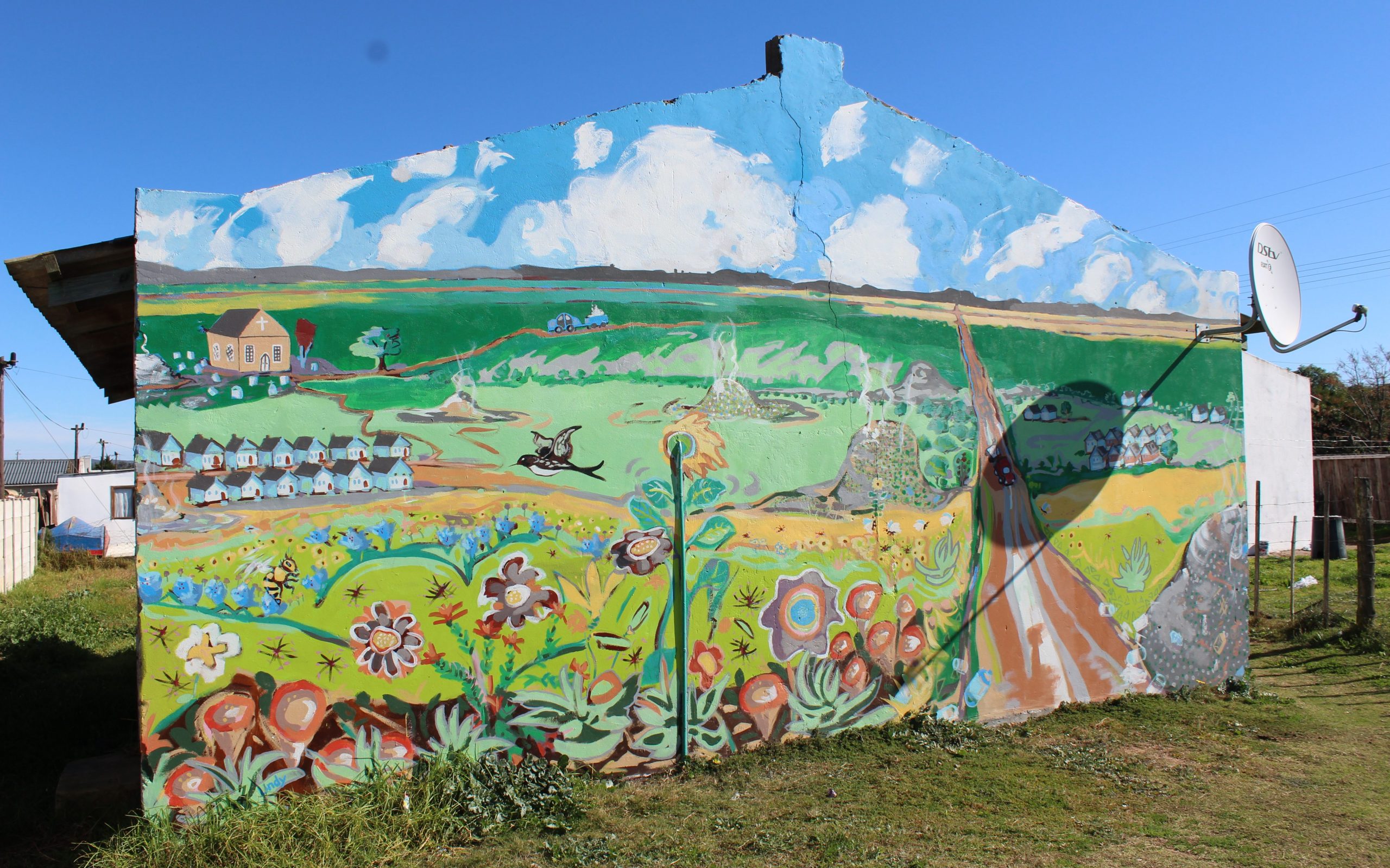
Expansion of the Community Waste Working Group to the wider Stilbaai area including Hessequa Municipality waste staff and youth. This included a meeting of with a representation of the Stilbaai, Melkhoutfontein and Jongensfontein eco-system at the Dreamcatcher office, sharing the work to date by the Dreamcatcher Team. A comprehensive presentation sharing the waste challenges, included a decades worth of images evidencing poor waste practice, providing solutions with which the group engaged and provided further options for implementation. A request by the Hessequa Waste Manager to provide the Municipality with a comprehensive plan of action with costs based on the presentation and discussions which followed. As part of the Paint Up with Kamamma project, at the communities request, visiting artist Lindy Bishop (USA) painted a mural highlighting the impact of waste on the environment and public health.
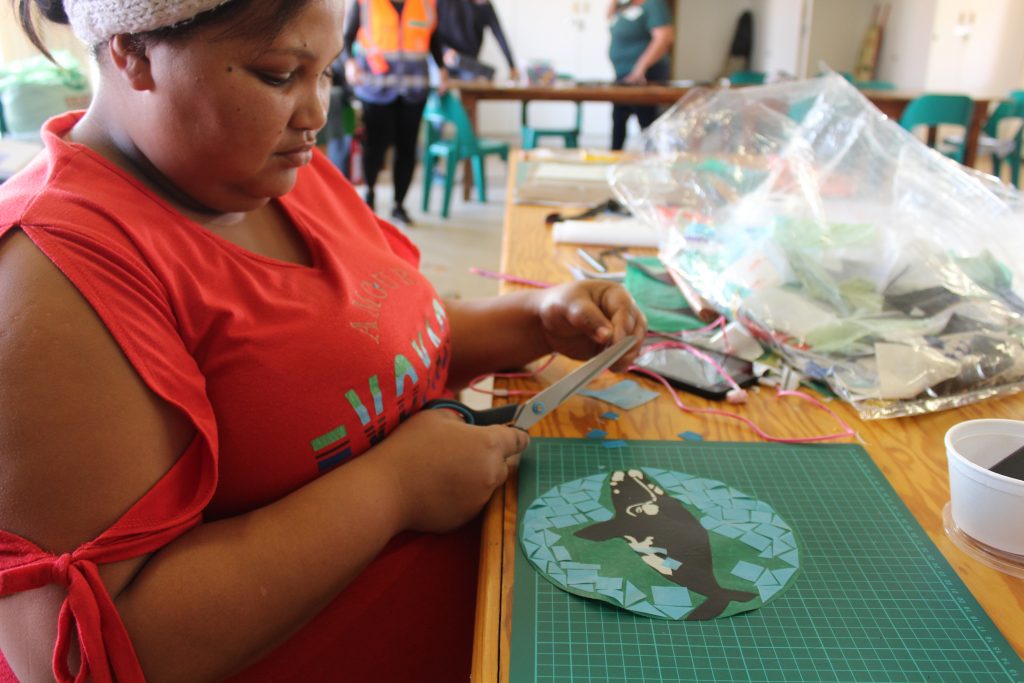
A successful joint bid by Dreamcatcher and the University of Brighton to the British Council Developing Inclusive and Creative Economies (DICE) programme generated funds for the delivery of waste, design, making, health and safety, and enterprise training to implement our ideas. Aspiring enterprises from Melkhoutfontein were recruited and received training focusing on designing and making with Acacia cyclops, plastics and textiles. This included pop up workshops at the Dreamcatcher Home Office and Soeterus. The training and support to enterprises culminated in the 2019 Christmas market which was open to the public to buy crafts. The project is ongoing and has expanded to include additional waste materials. You can read more about the project here.
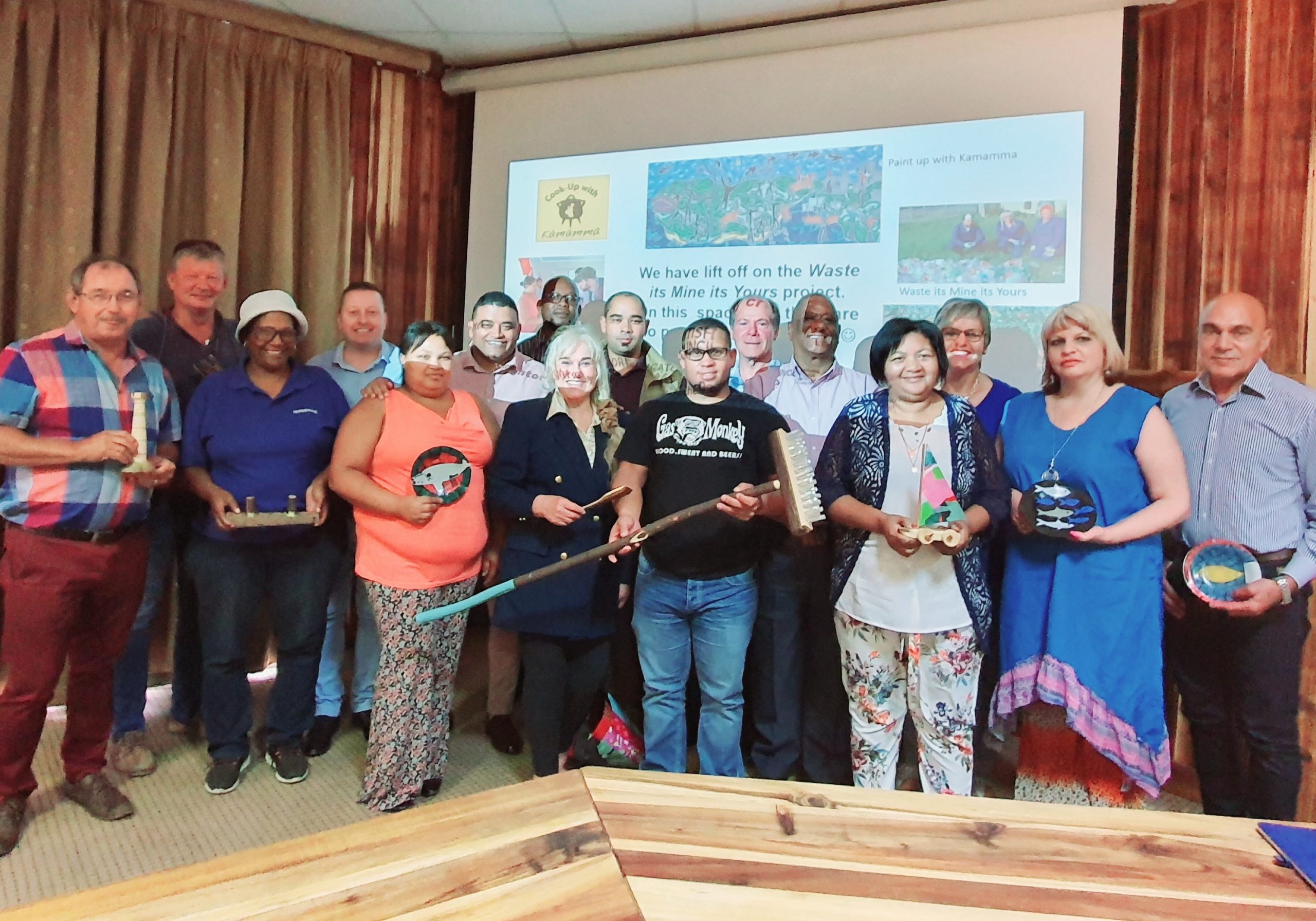
In January 2020, on invitation by the Speaker of the Hessequa Municipality, our Founder and representatives from the Dreamcatcher enterprises ('Made in Melkhoutfontein') were invited to deliver a presentation of our work to Hessequa Council. A collection of the crafts made from waste diverted from landfill by Dreamcatcher were exhibited. Sadly our work and that of the inspiring local crafters of Melkhoutfontein was held up for the next 2 years due to the Covid pandemic. During this time Dreamcatcher and its founder were globally recognised for their work on waste and environmental protection - including being awarded the 2020 Africa Tourism Leadership Forum Championing Sustainability Award
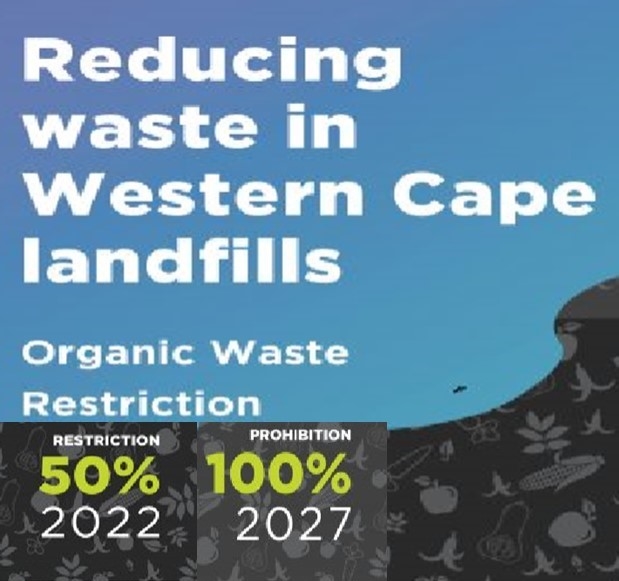
The ‘Western Cape Waste Plan’ set the target to divert 50% of organics from disposal by 2022 and 100% by 2027. The Plan targeted organics as they break down in landfill generating greenhouse gases contributing to climate change, and resources are lost. However whilst there were strategies in place very little was being implemented by Hessequa Municipality to meet these targets, and there was increased concern, including now in neighbouring Stilbaai, of the poor waste system and the long term environmental impacts and economic implications on the tax payer. Hessequa's waste approach continues to be reliant on artificially cheap landfill - which is an unstainable solution for people and the environment - and inhibits circular thinking and climate action.
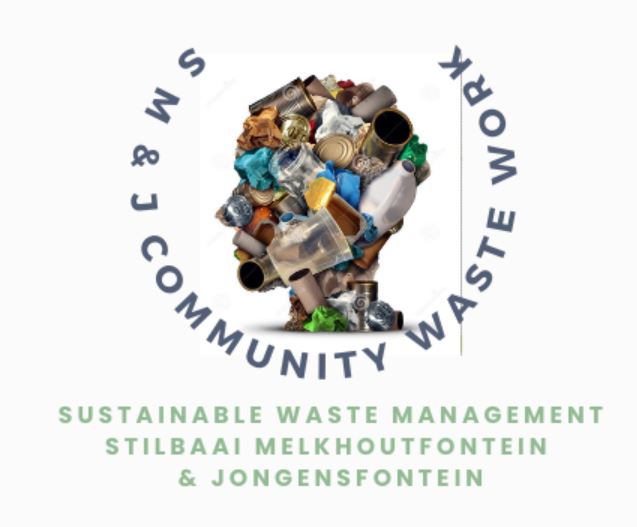
In March 2022, at the request of the wider community, Dreamcatcher facilitated a meeting to discuss the ongoing waste issues. Participants included: Cape Nature, Stilbaai Chamber of Commerce, Stilbaai/Jongensfontein Interest Forums, Busy Lizzies Women’s Forum, Tuin op die Brak (gardening organisation), Farmer Association, Stilbaai Conservation Trust, Melkhoutfontein Enterprise Group, and independent representatives. There is commitment from the stakeholders to develop community-driven solutions to the challenges posed. The Community Waste Working Group evolved into the S M & J Community Waste Working Group – which is independent of the municipality.
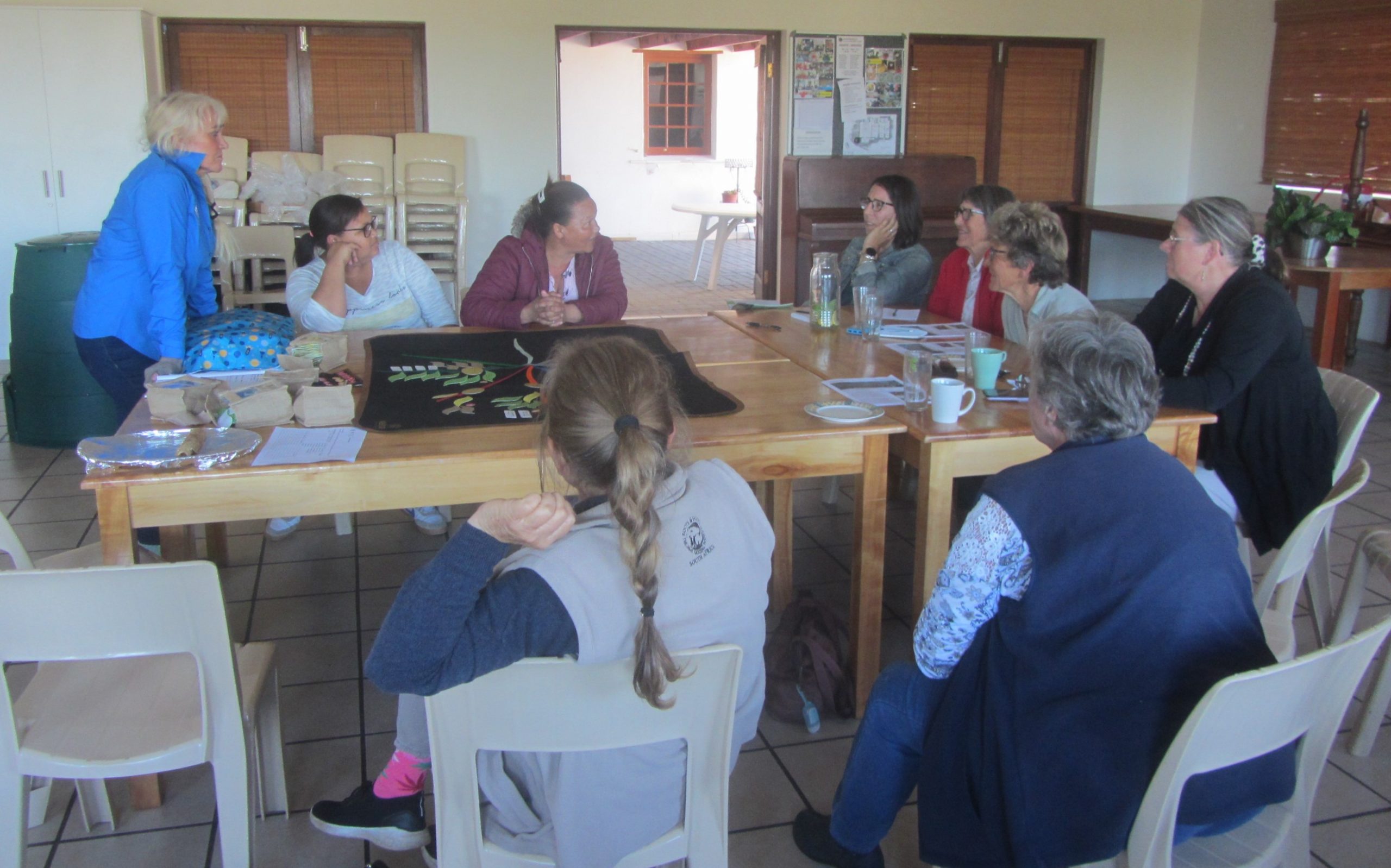
In late 2022 Dreamcatcher were successful with a bid to the IGNITE fund (UK) to facilitate community engagement in collaboration with the University of Brighton and S M & J Community Waste Working Group to identify the waste challenges and potential solutions to feed into a Community Waste Action Plan to drive change. This included a comprehensive review of relevant policy and waste documentation for Hessequa and the wider area, two learning labs with key ecosystem members and questionnaire responses from residents and businesses. We had 298 questionnaire responses from across the three communities – the most comprehensive engagement with the community to date on waste issues. Thanks to all the participants, Stilbaai Business Chamber, Mariann Harris (Stilbaai Information Bureau) and Dr Nick Geldenhuys (Stilbaai Interest Forum), and all the members of the S M & J Waste Working Group for driving change.
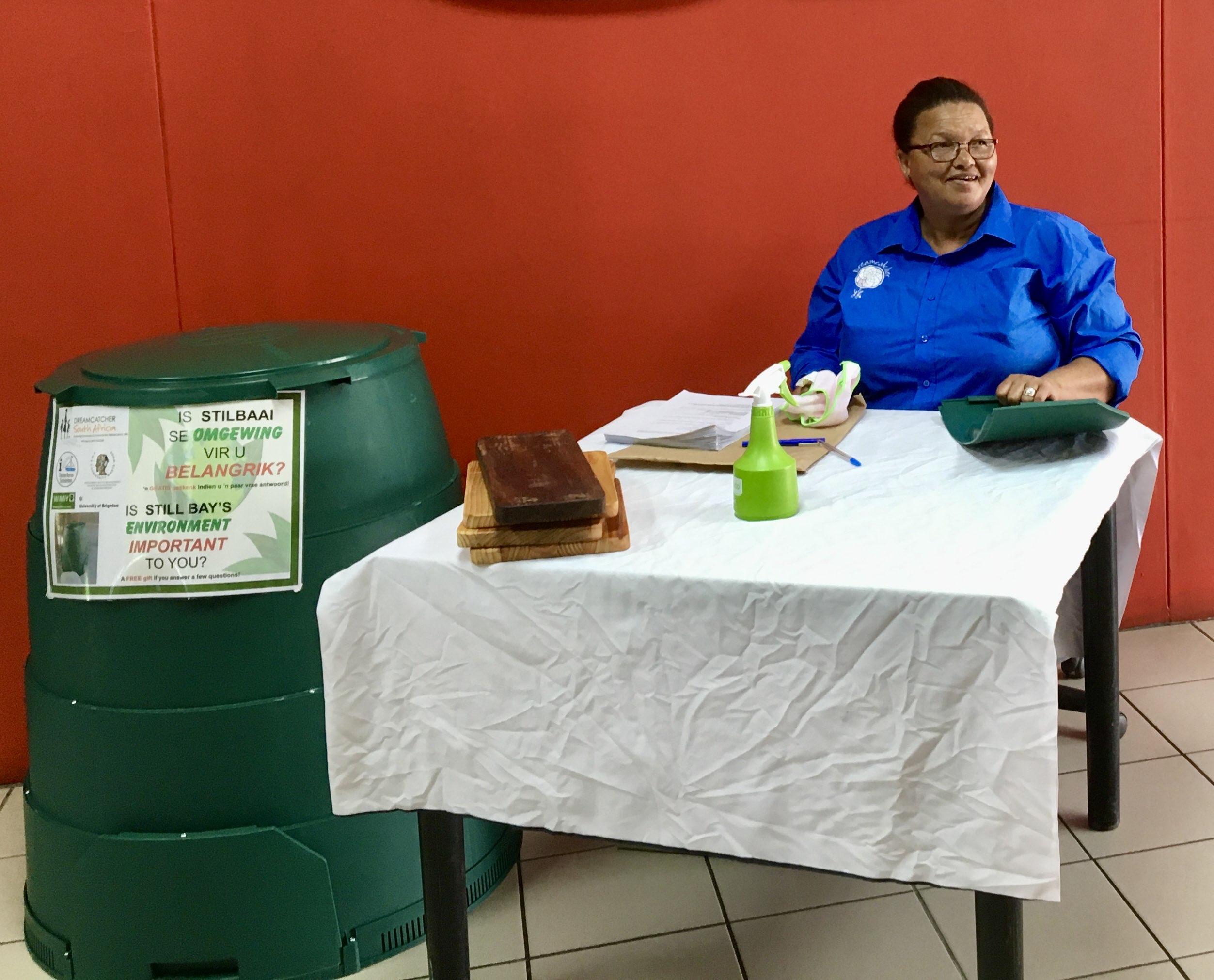
Late 2023 – Community Waste Action Plan published – including short and medium initiatives to address the waste challenge. Key priorities include addressing organic waste, increasing the quality and quantity of recycling collection, and purposed waste awareness programmes. Based on our extensive experience with community participative composting, Dreamcatcher committed to drive the procurement and distribution of composters.
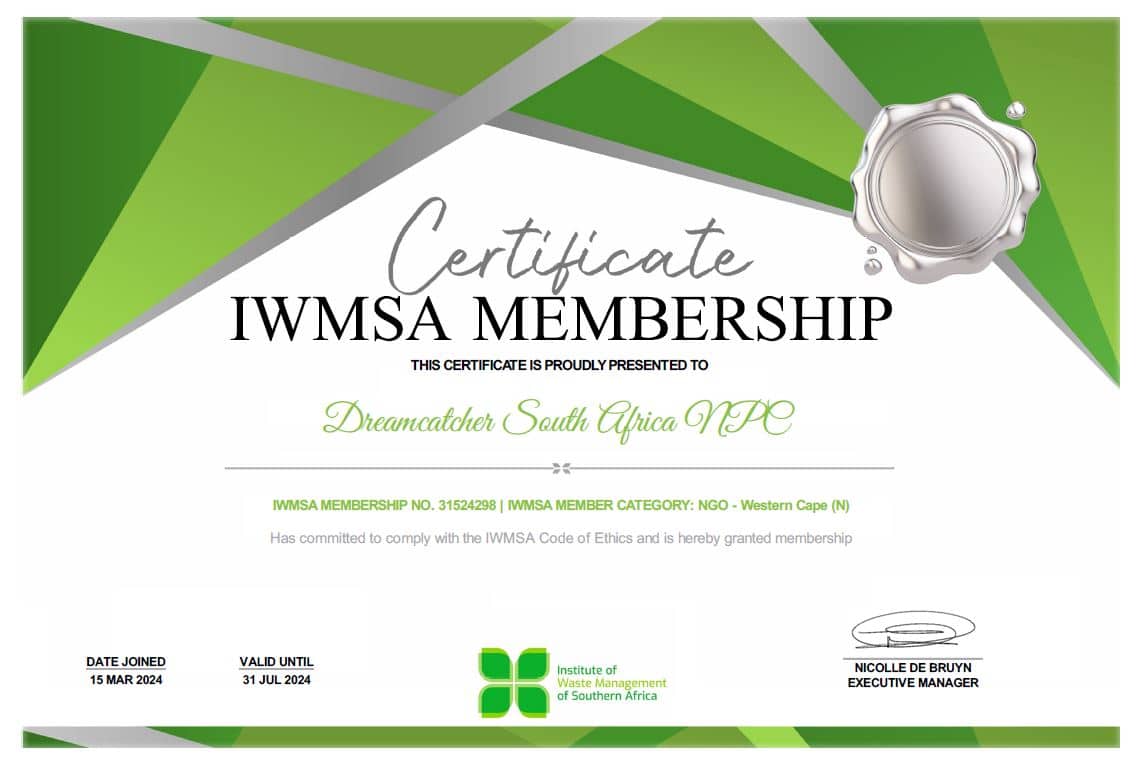
Based on our longstanding waste work we were accepted as members of the Institute of Waste Management of Southern Africa.
The Institute strives to protect the environment and people of southern Africa from the adverse effects of poor waste management by supporting sustainable best practical environmental options.
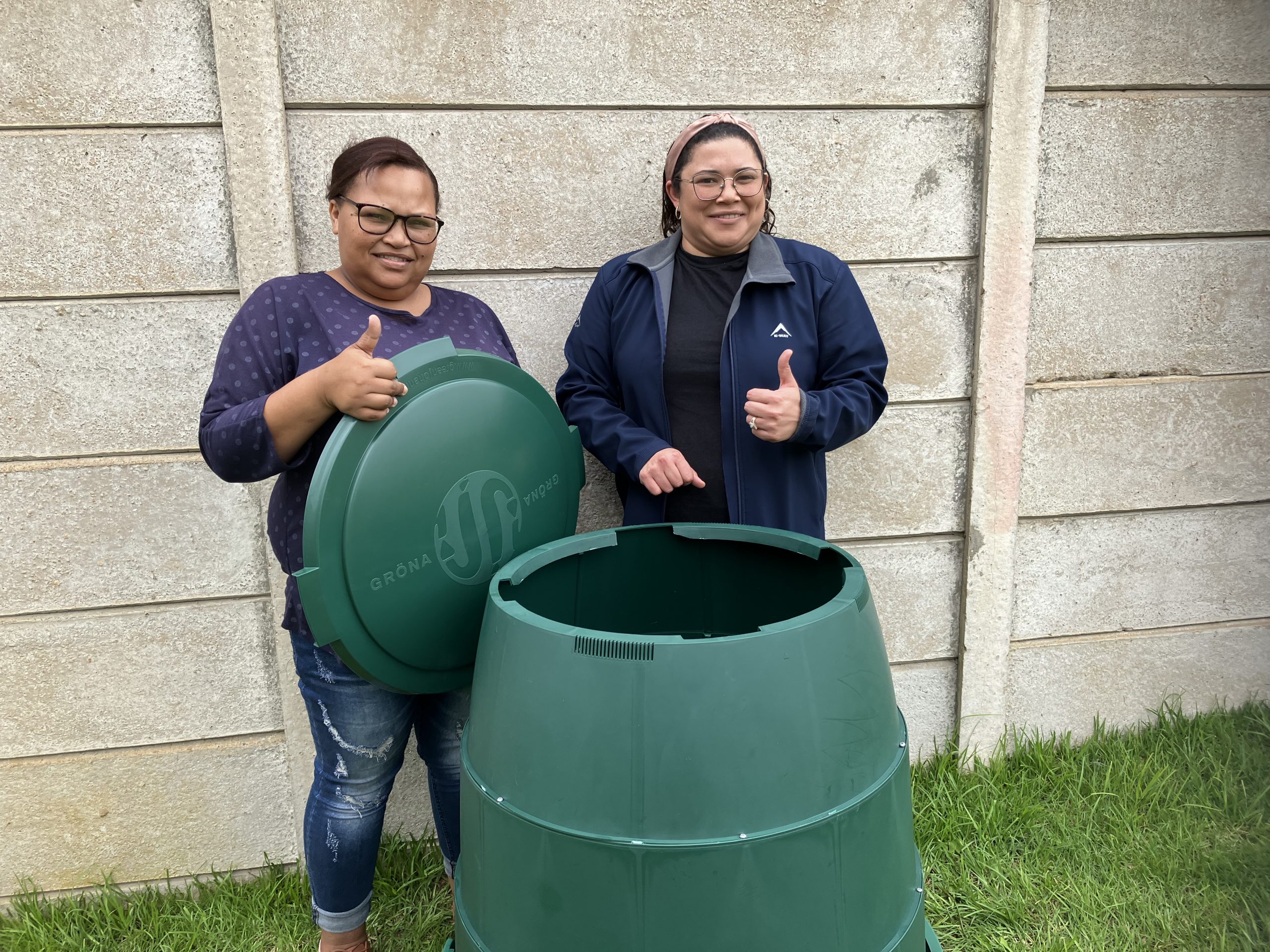
Due the critical need to reduce levels of organic waste going to landfill, Dreamcatcher facilitated the import of 115 Green Johanna units to South Africa. After a longer than expected journey due to current world events – the units arrived in Melkhoutfontein in March and are now ready for distribution in the wider Stilbaai area. You can find more about the initiative here including details of how you can order a Green Johanna.